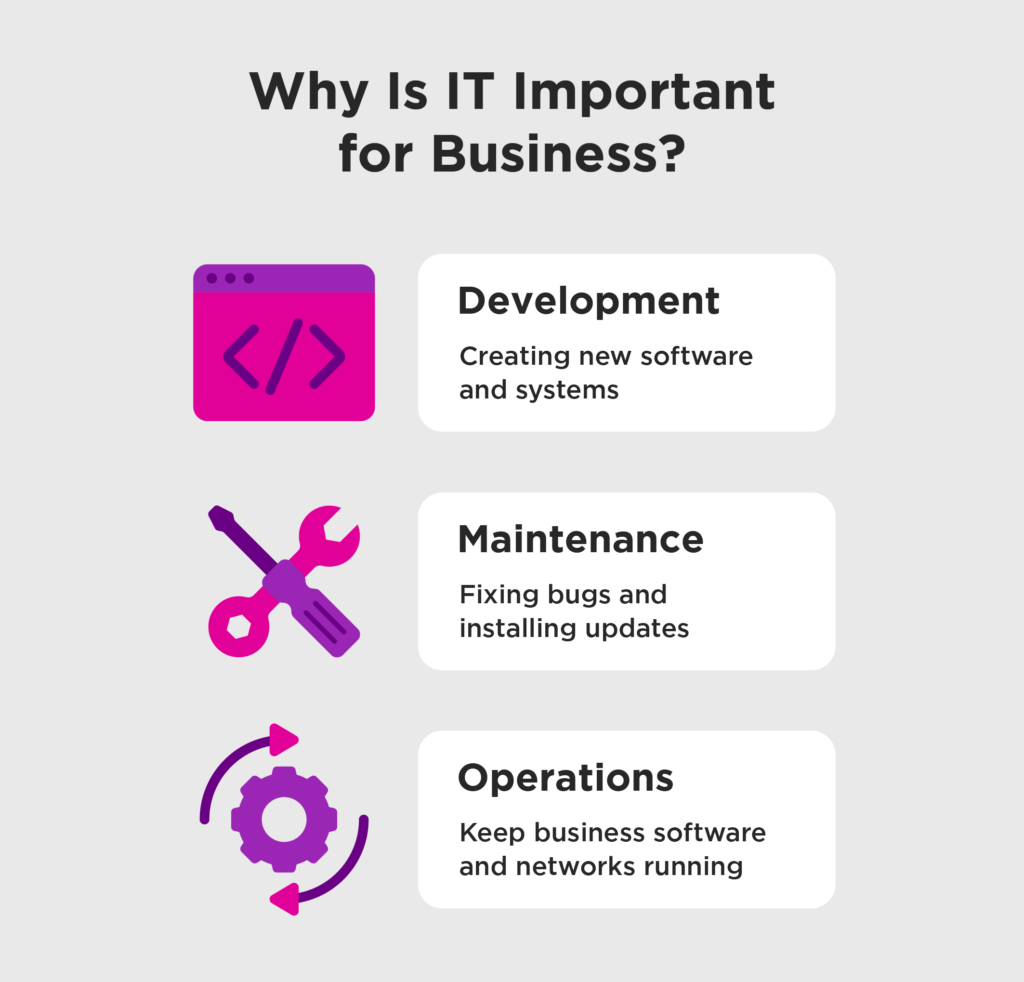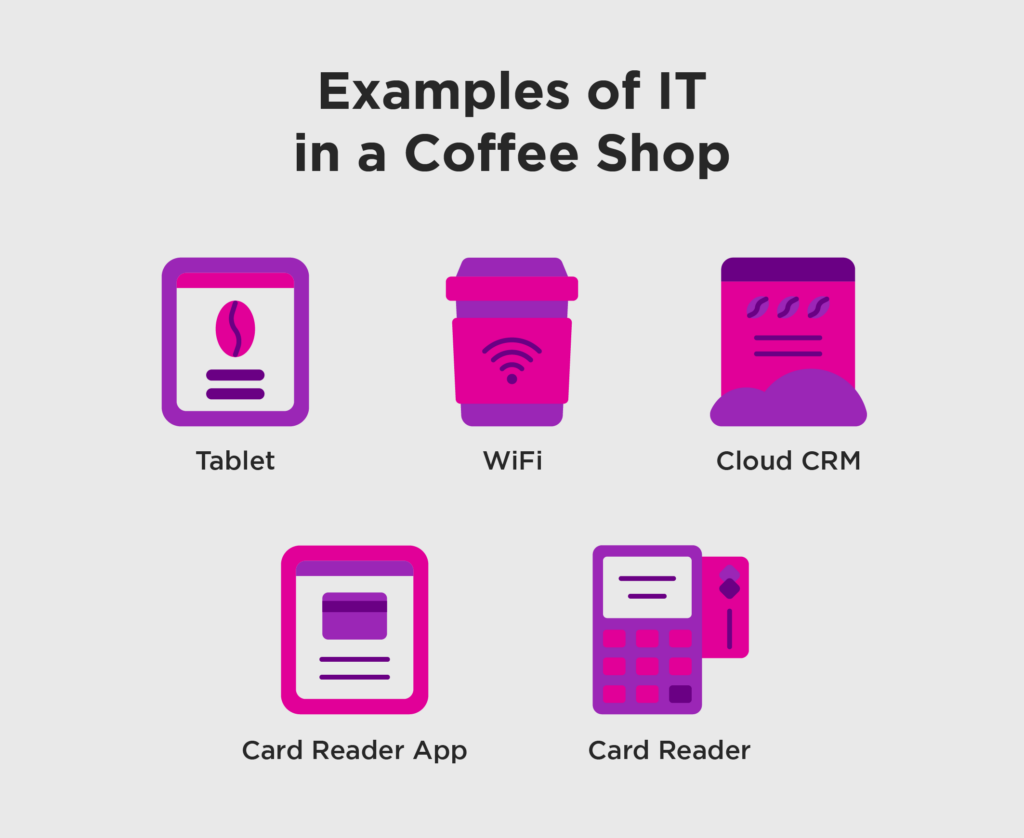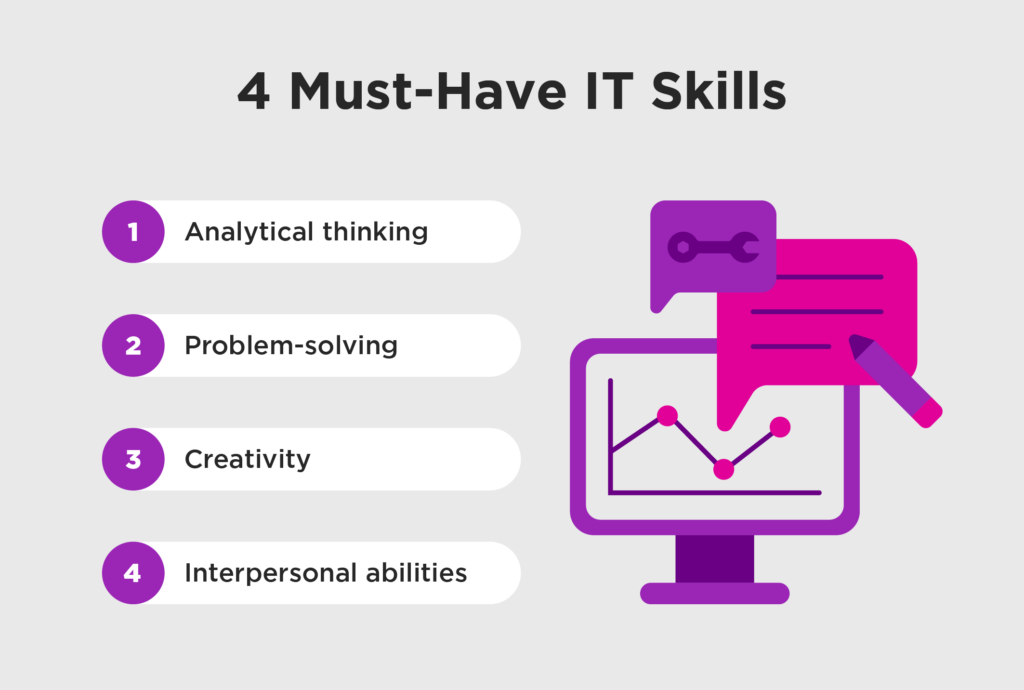What Is Information Technology (IT)? Types, Jobs, and Top Skills

quick answer
Information technology (IT) are the systems or equipment used to retrieve, store, manage, generate, or transfer information. The technology may include computers, storage devices, artificial intelligence, software, networks, cybersecurity, and more. Most businesses have IT roles or departments.
In This Article
Your school or workplace probably has an IT department. But what is IT? Is it just a fancy word for computers?
Information technology (IT) is an umbrella term for systems or equipment that retrieve, store, manage, generate, or transfer information. The technology may include computers, storage devices, artificial intelligence, software, networks, cybersecurity, and more. The information can be anything from puppy photos to unstructured data lakes.
While anyone who works in IT is familiar with these technologies, IT jobs range in specialization. There are jobs in cybersecurity, data analysis, product development, and more. Information is essential in today’s business world, which means IT is more important than ever.
Here, we’ll explore different types of information technology, their importance in business, the roles you can pursue in the field, and the skills required of any IT professional.
IT is important because it speeds up processes and makes work more productive. The internet lets us share information faster, digital records let us access important information immediately, and data analysis has become a part of decision-making in business.
In our day-to-day lives, technology shapes the way we think, eat, shop and work. IT lets us shop online, order food with our smartphones, work remotely with a laptop, and interact with the world through social media.
Whether you work an IT job or not, IT affects everybody’s career in the modern world. There are many applications for IT, from robotics in warehouses to automated technologies in business. Let’s look at the types of IT that exist today and get a picture of how widespread it is.
There are many types of industries within IT, as well as products. With so many types of IT, this list could go on and on. We’ve included 29 examples to show a wide range and highlight their differences.
Remember, IT industries are interdisciplinary and can overlap with related industries. You can see plenty of examples in this list. For example, the robotics industry includes IT, electrical engineering, kinematics, mechanical engineering, and more.
Types of IT Industries:
Types of IT Products:

IT is essential for business because it can improve processes, support innovative ideas, and keep organizations competitive. To put this into a business context, we can break down IT into three important categories:
There is a world of possibilities for IT in business. Real-time information can connect warehouses from across the globe and provide information at the touch of a button. Let’s explore some examples of IT in business.
From data processing to analytics, it’s uncommon to find a business that doesn’t use IT. By their nature, big businesses need complex IT systems to manage large amounts of information. Still, even small businesses can use lots of IT for something as simple as buying a cup of coffee.
For example, an independent coffee shop can take orders and payments with a tablet. The tablet can accept credit card payments through a card reading device and application. The tablet stores the customer’s email by connecting to a customer relationship management (CRM) system hosted in the cloud. The customer can choose to have a digital receipt emailed to them.

IT can provide many opportunities, but also some risks. Many businesses have dedicated processes and frameworks for managing their IT. This includes:
Where there’s business, there’s IT. The IT industry’s market value was $7989.7 billion last year! The industry is continuing to grow, and plenty of exciting work opportunities exist.
In a sector as diverse as information technology, it’s no surprise that the scope of IT jobs is just as massive. Best suited for those with a technical background, IT jobs can be anything from Software Developers to Data Scientistss. Now, let’s discover some great jobs to pursue in IT.
Full Stack Web Developers build comprehensive web solutions, which means they work on multiple aspects of a website. Typical Web Developers mostly focus on the front end of a site, while Full Stack Web Developers work on both the front and back end.
Full Stack Web Developers can:
It’s an exciting role in today’s digital business world. The Robertson College Full Stack Web Developer Diploma Program can give you the necessary skills and experience for a successful career.
Average Annual Salary: $81,153
Education Required: Diploma, Degree
Average Time to Complete: 1-4 years
Cyber attacks occur every 39 seconds, so security is a big concern for almost every organization. Every industry manages some level of private data, from small businesses to enterprise organizations. Whether it’s customer data or internal information, there is a lot of information needs to be secure.
Cyber and Cloud Security professionals can:
No two days are the same in this line of work. If you like working with teams and providing creative solutions to complex problems, you should consider this career. Robertson’s Cyber & Cloud Security Diploma Program can give you the skills and knowledge needed for this growing industry.
Average Annual Salary: $80,605
Education Required: Diploma, Degree
Average Time to Complete: 1-4 years
One of the most important aspects of IT is networks — the connected computers and devices that exchange information across a business. The network uses physical servers and cables to securely connect computers across the business.
Without proper network infrastructure, businesses can become inefficient and suffer as a result. A Network Systems Administrator does everything in their power to avoid business disruptions.
Network Systems Administrators can:
Every day can present a new challenge for Network Systems Administrators. You can get the skills and experience for this vital role by earning a Diploma or Degree.
Average Annual Salary: $72,180
Education Required: Diploma, Degree
Average Time to Complete: 1-4 years

Surprisingly, this isn’t a super long list. IT professionals can be highly specialized, but they all share a core set of skills. Some of the top skills for IT professionals include:
For example, Help Desk Support Technicians need to clearly communicate with customers. Sometimes walking them through complex steps to troubleshoot software issues. If you have solid interpersonal and problem-solving skills, you’ll be well on your way to success in these roles.
In today’s digital age, technology will continue to challenge and evolve in almost every aspect of our lives. The world needs specialists trained to understand the full extent of these technologies, continue developing new and improved software and web solutions, and maintain and troubleshoot existing programs. The future of IT looks bright, and it’s not dimming anytime soon.
At our School of Technology, we offer six programs for students wanting to hone their craft as IT professionals:
These programs are offered online and at our Winnipeg, Edmonton, and Calgary campuses. Our programs have in-class lectures covering foundational knowledge, hands-on learning, independent project-based coursework, and compulsory practicums. The practicum allows students to apply the concepts and skills they’ve learned during the program in an industry setting.
The world of work is changing, and by investing in training IT professionals, we are investing in the future. Think of all your favourite products, services, and businesses — none would be possible without a hardworking team of IT professionals.
IT professionals are detail-oriented, so we don’t want to miss out on answering any questions. Let’s dive into a few common questions to shed some light on this exciting career path.
There are many IT roles inside and outside the IT industry. People in IT can create, develop, manage, and support IT systems. IT jobs can involve working with hardware, software, or both.
For example, Network Administrators work with networks, and Cybersecurity professionals deal with security. Both of these IT roles deal with network security. Indeed, their jobs may overlap, but they have different skills and responsibilities.
Let’s break IT down into categories. Every job in IT will deal with some or all of these concepts. The five basic categories of IT are:
If you have a special interest in one of these categories, consider a specialization. Do you love coding? You can pursue your passions and have a great career as a Web Developer.
At first look, IT and computer science might sound the same. They both work with computers, right? True, but there are some big differences between the industries.
Computer science studies computers and everything they can do (computation). This can include information technology, but computer science is also about abstract concepts and theories.
IT is different from computer science because it is specifically about information technology — which isn’t specifically about computers. For example, IT deals with the physical ethernet cables that connect computers in a local area network (LAN).
Yes. There are very good job prospects for tech workers in Canada. Labour shortages have impacted the industry, and companies are looking for IT professionals in Canada and globally.
So, what is IT to you? It could be an exciting career full of skills that you can take anywhere. Best of all, a Diploma can help you build knowledge, gain skills, and get experience on the job.
Join a rapidly-growing industry with a Diploma from the Robertson School of Technology. Study online, on your time, with the support of our dedicated Workforce team.
In This Article
Once you take the first step, one of our Student Admissions Advisors will get in touch to better understand your goals for the future.
Apply Now